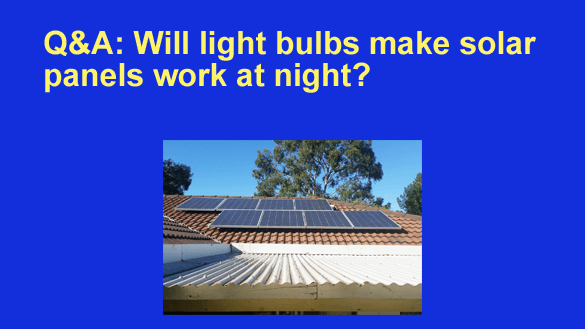
Want to get my easy to follow Tech Tips in your email?
Sign up for my daily Rick’s Tech Tips Newsletter!
Question from Mark: I have a small solar power setup (about 400 watts) that’s powering the lights and the TV in the small off-grid cabin I built for weekend getaways.
I tried running a portable refrigerator and a couple of other small appliances off the solar and they work fine during the day, but my 12V/100Ah battery is dead by morning when I leave everything running overnight.
My question is will solar panels work with artificial light? What I have in mind is mounting a string of low-power LED bulbs above the panels to provide light when the sun isn’t shining.
Rick’s answer: The short answer to your question is yes, Mark. Solar panels will indeed produce electric current when exposed to artificial light. The problem is they won’t be able to produce enough wattage to make it worth your while, for the following reasons:
1 – Solar panels are engineered to respond to virtually all of the wavelengths of visible light as well as much of the spectrum of infrared light. They can even make use of a small range of ultraviolet wavelengths.
All of those wavelengths together team up to force a solar panel to produce up to the maximum amount of power the panel is capable of producing (the actual amount of power produced depends upon the intensity of the light that’s striking the panel).
Unfortunately, light bulbs don’t produce anywhere near a wide enough range of wavelengths to cause a solar panel to produce the amount of wattage it’s capable producing when exposed to sunlight.
Incandescent bulbs probably come closest to producing the full range of wavelengths that are produced by the sun, but even those fall far short.
2 – Light bulbs of all types are inefficient when it comes to using the power they consume in order to create light.
LED bulbs are currently the most efficient bulbs that you can buy, but even they waste a portion of the energy they consume in various ways (they generate heat, for example).
3 – Even if you could find bulbs that are 100% efficient (i.e. every bit of the energy they consume would generate light), they would still have to be powered. And where would that power come from in an off-grid situation? From the very batteries they’re trying to charge.
With the light bulbs drawing their power from the batteries they’re trying to charge, they (along with the solar panels) would have to first replace the energy they would themselves consume before they could even begin to start charging the batteries.
Of course you could overwhelm the panels with numerous incandescent bulbs that are plugged into grid power and force them to generate a fair amount of “solar” power, but that would defeat the purpose of going off-grid in the first place (and it wouldn’t actually be off-grid anyway since the bulbs would be drawing their power from the grid).
As you can see, even though solar panels will indeed produce electric current when exposed to artificial light, they could never produce enough power to make the effort pay off.
I’m afraid your only viable option is to upgrade your current solar power system with enough battery storage capacity to power all the devices you need to power over a 24 hour period while also adding enough solar panels to recharge the batteries every day.
Now that we have all of that out of the way, here’s something for you to think about…
I believe scientists and engineers will some day come up with devices that can produce usable electricity via the absence of sunlight.
In fact, researchers at Stanford University have already managed to modify solar panels in a way that causes them to produce tiny amounts of electric current at night.
The rapid pace at which technology is advancing today makes me optimistic about the possibility of someday having panels that produce as much energy at night as current solar panels are capable of producing during the day.
When (and if) that happens that will virtually eliminate the need for batteries, which are the typically most expensive components in off-grid solar power installations.